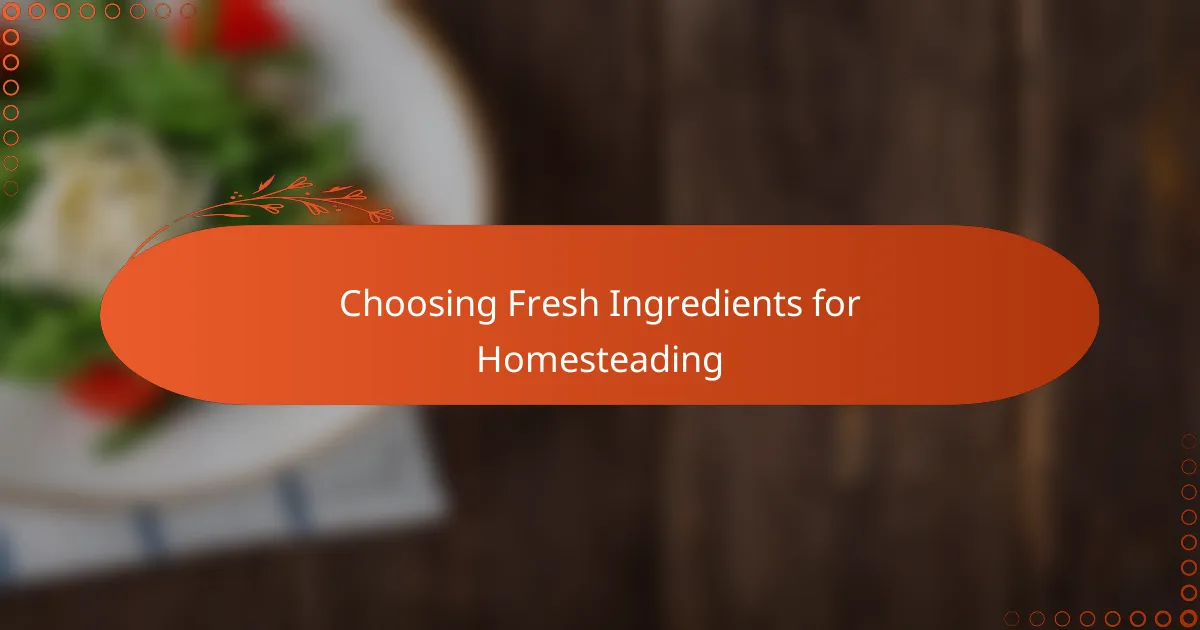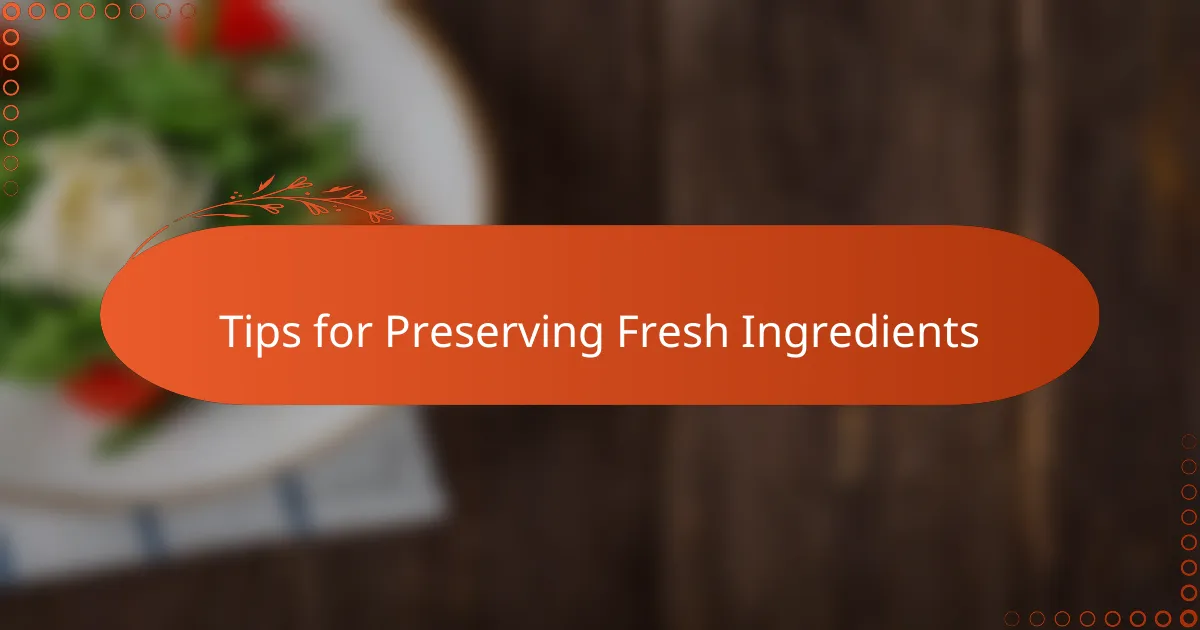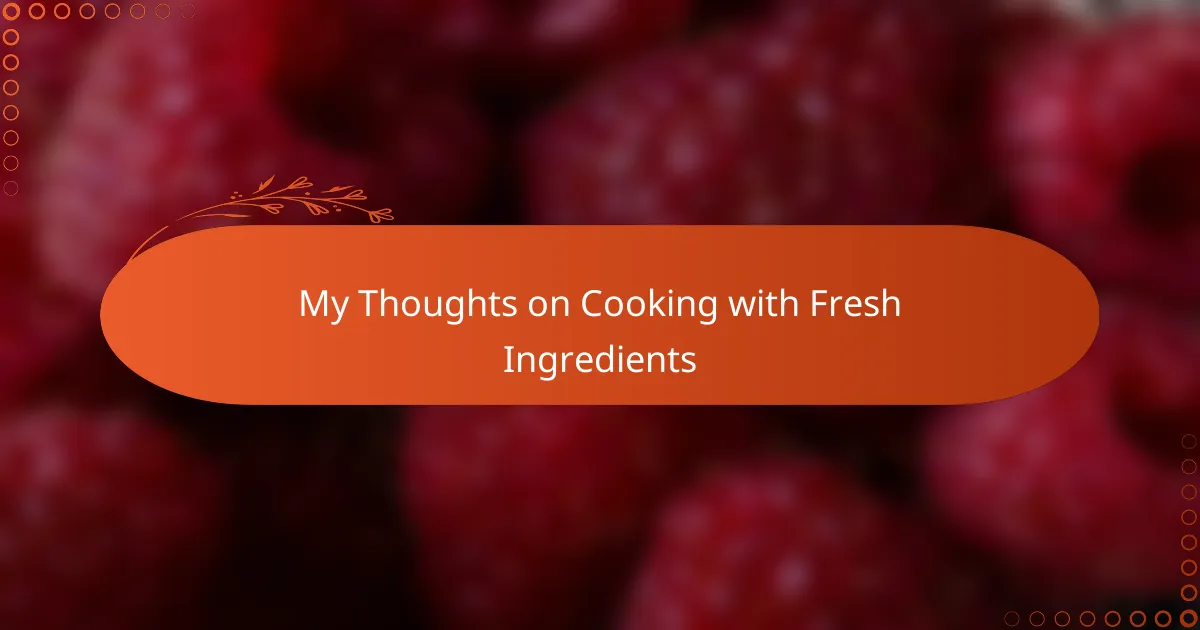Key takeaways
- Fresh ingredients enhance the flavor, texture, and nutritional value of meals, transforming the cooking experience into a mindful connection with food.
- Cooking with fresh produce encourages creativity and spontaneity, allowing for vibrant, enjoyable meals that celebrate seasonal bounty.
- Understanding the sourcing and seasonality of ingredients fosters a deeper appreciation for food and can improve the shelf life and usability of produce.
- Simple recipes using fresh ingredients can lead to profound satisfaction, emphasizing the importance of freshness in cooking.

Understanding Fresh Ingredients in Cooking
Fresh ingredients bring a unique vibrancy to cooking that dried or processed foods simply can’t match. I remember the first time I used just-picked tomatoes in a sauce—the brightness and subtle sweetness completely transformed the dish. Have you ever noticed how the texture and aroma of fresh herbs can lift a meal in ways packaged spices never do?
Understanding what makes an ingredient truly fresh means paying attention to its source and seasonality. When I started homesteading, I learned the value of harvesting herbs and vegetables at their peak—it’s like catching a fleeting moment of nature’s best flavor. Isn’t it fascinating how a simple carrot from your own garden tastes so different from one bought weeks ago in a store?
Freshness also affects how ingredients interact during cooking. I’ve found that fresh produce often requires gentler methods to preserve their natural flavor and nutrients, teaching me to cook with more care and patience. Doesn’t this attention to detail make the cooking experience more rewarding, turning it into a mindful connection with your food?

Benefits of Cooking with Fresh Ingredients
Cooking with fresh ingredients has this incredible way of making every meal feel more alive. I recall a time when I tossed freshly picked basil into a simple pasta dish—the scent alone brought back memories of sunny afternoons in my garden. Isn’t it amazing how freshness isn’t just about taste but also about awakening our senses in the kitchen?
Another benefit that really stands out to me is the natural nutrition packed into fresh foods. I’ve noticed that salads made from just-harvested greens have a crispness and vitality that store-bought greens often lack. Have you ever experienced how eating fresh truly nourishes you beyond just filling your stomach?
From my experience, cooking with fresh ingredients also encourages creativity. Because their flavors are more distinct and vibrant, I find myself experimenting more, balancing tastes and textures with ease. Doesn’t it feel rewarding when your cooking becomes a colorful, sensory adventure rather than a routine?

Choosing Fresh Ingredients for Homesteading
Choosing fresh ingredients for homesteading feels like coming home to the very essence of the land you tend. I remember the delight of picking crisp lettuce from my garden at dawn—it wasn’t just about the taste but the connection to the soil and season. Have you ever thought about how sourcing ingredients directly from your homestead adds a layer of pride and authenticity to your cooking?
I’ve learned that selecting fresh produce means knowing when and where to pick. Early morning harvests often yield the best flavors, as the plants are full of moisture and vitality. It makes me wonder—how many meals have we missed out on simply by relying on supermarket produce that lacks this natural rhythm?
One thing I always keep in mind is how freshness influences the shelf life and usability of ingredients in homestead cooking. Fresh eggs, just gathered, have a creaminess unmatched by store-bought, and fresh herbs keep their fragrance much longer. Don’t you find that using these ingredients not only improves the food but deepens your respect for the simple, beautiful bounty of homesteading?

Essential Recipes Using Fresh Ingredients
When I think of essential recipes using fresh ingredients, simple dishes come to mind—like a garden-fresh tomato salad tossed with just a drizzle of olive oil and a sprinkle of herbs. There’s something so satisfying about how the crispness of each bite highlights the freshness, making every ingredient shine on its own.
One timeless recipe I always return to is a hearty vegetable stir-fry using whatever’s ripe in the garden. It’s remarkable how fresh vegetables demand even less seasoning; their natural flavors create a harmony that no packet of spices could replicate. Have you ever noticed how fresh ingredients give you room to play with textures and colors, turning a quick meal into a vibrant celebration?
I’ve also found that cooking from fresh ingredients teaches patience—like gently cooking a medley of freshly picked greens just until they wilt, preserving their color and nutrients. These moments make me appreciate the ingredient’s journey from soil to table, and they remind me that sometimes, the simplest recipes bring the most profound satisfaction. Wouldn’t you agree that this mindful approach changes the way we value every forkful?

Tips for Preserving Fresh Ingredients
One simple tip I always lean on is storing fresh herbs like a bouquet—trim the stems and place them in water on the counter. This little ritual has saved countless bundles I thought would wilt too quickly. Have you ever noticed how a quick spritz of water can revive slightly limp greens almost instantly?
Freezing is another trick I swear by, especially for berries and garden tomatoes. I remember harvesting so many tomatoes one autumn that freezing them in sauce portions felt like bottling summer’s warmth for the colder months. Doesn’t it feel almost like cheating to have that burst of freshness whenever you want?
Lastly, I’ve found that keeping root vegetables in a cool, dark place extends their life in a way refrigerated crisper drawers never do. There’s something satisfying about knowing your pantry stores are thriving quietly, ready for their moment in your kitchen. How often do you think about the rhythm of your ingredients beyond just putting them on your plate?

Personal Experiences with Fresh Ingredient Cooking
Cooking with fresh ingredients has always been a revelation for me. I recall the first time I tasted a salad made from lettuce picked just moments before—I could literally taste the earth and sunshine in every bite. Have you ever experienced that immediate connection to the garden that makes food feel so much more alive?
There’s also a kind of calm that comes with working only with fresh produce. I remember standing at my kitchen counter, gently washing the morning’s harvest, savoring the vibrant colors and crisp textures before even beginning to cook. Doesn’t that simple moment make you appreciate food in a whole new way?
Sometimes, fresh ingredients invite me to slow down and really pay attention to my cooking. For instance, when I sauté fresh garlic and herbs, I notice how the fragrance unfolds differently compared to dried spices—each step feels like a sensory journey. Have you noticed how fresh flavors almost demand a more mindful approach in the kitchen?

Creating Seasonal Menus at Home
Creating seasonal menus at home feels like tuning into nature’s own rhythm. I often find myself flipping through my garden’s bounty, asking which flavors speak to this moment of the year. Have you ever noticed how each season offers a different palette of tastes that inspire completely fresh ideas in the kitchen?
When I plan menus around what’s ripe and ready, cooking becomes less about following strict recipes and more about embracing spontaneity. For example, a spring harvest of tender peas and radishes calls for light, fresh preparations, while autumn’s squash invites heartier, warming dishes. Doesn’t it make mealtime feel more connected and alive when you cook according to the season?
I’ve also found that seasonal menus help reduce waste and elevate the flavor in every dish. By focusing on what’s naturally abundant, I avoid forcing ingredients out of their prime. Have you ever experienced how meals crafted from peak-season produce simply taste brighter and more satisfying? That’s the magic of seasonal cooking at home.



